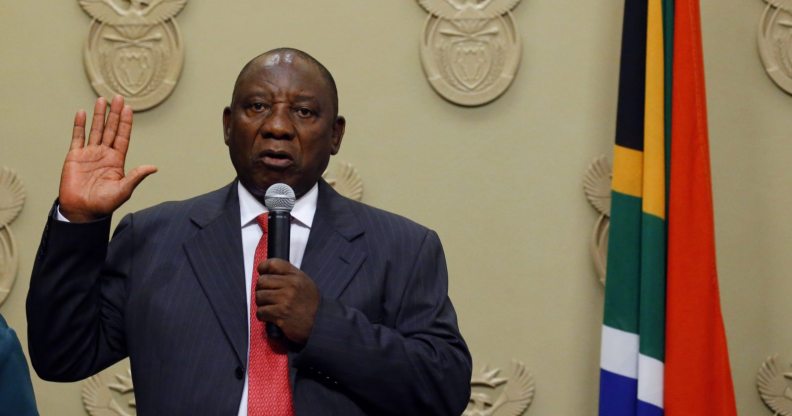What does South Africa’s new President Cyril Ramaphosa think about LGBT rights?

South Africa’s new president Cyril Ramaphosa holds up his right hand as he is sworn into office after being elected by the Members of Parliament at the Parliament in Cape Town, on February 15, 2018. (Photo by MIKE HUTCHINGS/AFP/Getty Images)
South Africa’s new President Cyril Ramaphosa has taken office after the departure of the embattled Jacob Zuma.
Ramaphosa, who had already been named head of the African National Congress, was sworn in as President today after the dramatic departure of Zuma, who resigned in the face of corruption allegations.
The new President, who served as Zuma’s deputy from 2014 until this week, has a broadly positive record on LGBT rights.
As chairperson of the country’s Constitutional Assembly in the 1990s, Ramaphosa was a key player in the decision to extend constitutional protection to gay people – a world first at the time.
The Constitution states: “The state may not unfairly discriminate directly or indirectly against anyone on one or more grounds, including race, gender, sex, pregnancy, marital status, ethnic or social origin, colour, sexual orientation, age, disability, religion, conscience, belief, culture, language and birth.
“No person may unfairly discriminate directly or indirectly against anyone on one or more grounds [above]”.

Newly appointed South African President Cyril Ramaphosa gestures as he delivers a speech after being elected by the Members of Parliament during his swearing in ceremony at the Parliament in Cape Town, on February 15, 2018. (Photo by MIKE HUTCHINGS/AFP/Getty Images)
Just a few months ago he recorded a video for an event celebrating the country’s LGBT community, in which he pledged his support for equality and praised the “beautiful humanity” of LGBT people.
In the clip, Ramaphosa said: “It is a sad truth that in our nation the LGBTI community are amongst the most vulnerable and marginalised. They suffer discrimination, violence and abuse.
“We must as a nation do better than what we are now.
“We are all born the way we are. We need to support, embrace and respect each other.
“When we treat each other with dignity, we are all more dignified. When we treat each other with respect, we are all more respected.
“It is upon us all to contribute to the creation of a more just, equal and safe society.

Newly appointed South African President Cyril Ramaphosa gestures as he delivers a speech after being elected by the Members of Parliament during his swearing in ceremony at the Parliament in Cape Town, on February 15, 2018.(Photo by MIKE HUTCHINGS/AFP/Getty Images)
“Every South African must hold themselves, our communities, our institutions and our government accountable for upholding our laws and for protecting the rights of all in South Africa.
“I wish you a glorious evening and ask that you enjoy yourselves, affirm yourselves and your identities as well as your various diversities and celebrate your wonderful, beautiful, outstanding humanity.”
What is happening to LGBT+ rights in South Africa?
He has also served as chair of the South African National AIDS Council, which has pioneered outreach to the LGBT community to tackle HIV/AIDS.
His record stands in stark contrast to Zuma, who was never personally supportive of LGBT rights.
Speaking in 2006, Zuma declared: “Same-sex marriage is a disgrace to the nation and to God. When I was growing up [a gay man] would not have stood in front of me. I would knock him out.”
South Africa became the first – and so far only – African nation to legalise the measure in the same year, under President Thabo Mbeki.
As President, Zuma declined to speak out against anti-LGBT laws in other African nations, insisting: “South Africa respects the sovereign rights of other countries to adopt their own legislation.”
Despite his outspoken comments Zuma did not seek to overturn the nation’s same-sex marriage law when he became leader.
LGBT people in South Africa have a patchwork of protections.
In May 1996, South Africa became the first jurisdiction in the world to provide constitutional protection to LGBT people, via section 9(3), which disallows discrimination on race, gender, sexual orientation and other grounds.
Although it was one of the first countries in the world to adopt same-sex marriage in 2006, it has resisted calls to adopt hate crime laws to tackle homophobia – and in some parts of the country anti-gay discrimination is still rife.
According a five-year report by the Hate Crimes Working Group, the most discriminated against group in South Africa are the LGBT community, with 35% of hate crimes reported coming from LGBT+ people.

